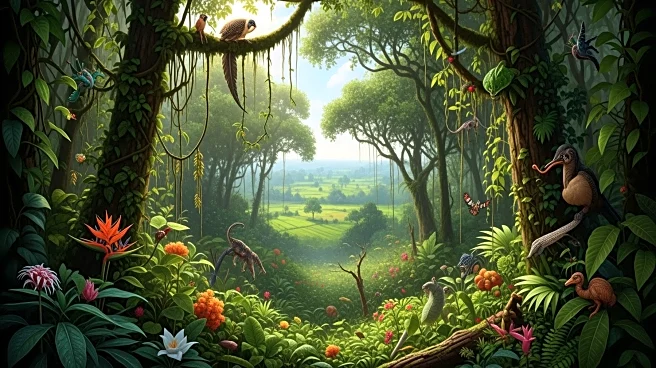What's Happening?
Brazil has become a major player in global agriculture, significantly boosting its economy through exports of soybeans, beef, coffee, and sugar. However, this growth has led to the conversion of natural vegetation into agricultural land, impacting biodiversity
and carbon storage. A recent study explores future land use scenarios in Brazil, highlighting the environmental trade-offs of agricultural expansion. Under a scenario of regional rivalry and fossil fuel reliance, agricultural land is expected to expand, leading to increased CO2 emissions and habitat loss for numerous species. Conversely, a sustainable scenario predicts reduced food demand and improved yields, allowing for land restoration and increased carbon sequestration.
Why It's Important?
The expansion of agriculture in Brazil poses significant challenges to biodiversity conservation and climate change mitigation. The loss of natural vegetation releases substantial CO2, contributing to global warming. Additionally, habitat loss threatens species with restricted ranges, impacting biodiversity. The study suggests that strategic land restoration could offer environmental benefits with minimal economic loss, highlighting the importance of sustainable land use planning. Brazil's approach to balancing agricultural growth with environmental conservation could serve as a model for other countries facing similar challenges.
What's Next?
Brazil's future land use decisions will be crucial in determining the balance between agricultural production and environmental conservation. Strategies to minimize deforestation in carbon- and biodiversity-rich areas are essential. Restoration efforts could enhance carbon sequestration and biodiversity, offering a cost-effective solution to climate change mitigation. Brazil's Greenhouse Gas Emissions Trading System may play a role in incentivizing sustainable practices. The country's path forward will depend on global food demand trends and agricultural yield improvements.
Beyond the Headlines
The study underscores the ethical and ecological implications of land use decisions in Brazil. Protecting Indigenous Lands and Conservation Units is vital for preserving biodiversity. The economic valuation of carbon sequestration highlights the potential for integrating environmental benefits into economic planning. Brazil's experience may inform global discussions on sustainable agriculture and climate policy, emphasizing the interconnectedness of economic and environmental health.















